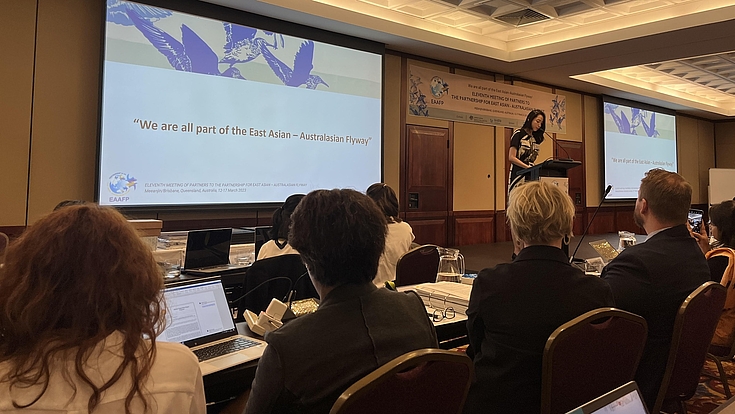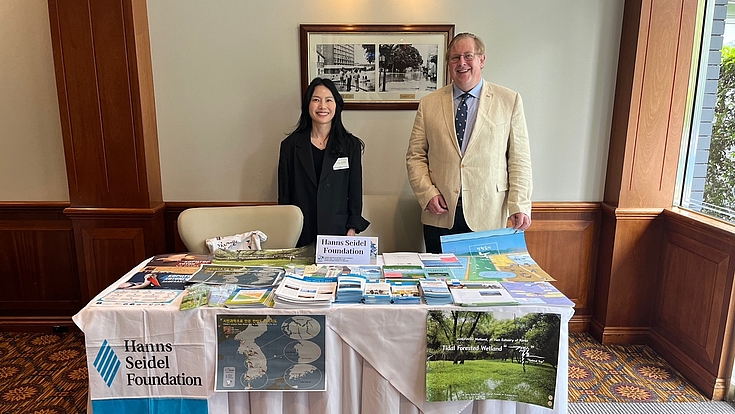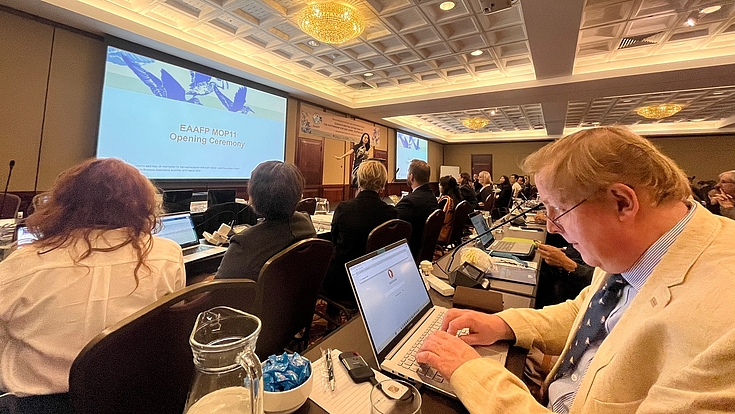Conference
Side event at the East Asian-Australasian Flyway Partnership (EAAFP) #MOP11 - The Yellow Sea

The Yellow Sea, in Korea also known as West Sea, is absolutely crucial for the whole East Asian-Australasian Flyway, since it is a bottleneck, through which millions of birds have to migrate twice a year. At the same time, rapid economic development in South Korea and China made many tidal flats in the area disappears. Fortunately, gradually there has been in a change of mind – South Korea and China stopped to reclaim any more land, and in DPRK (North Korea), while reclamation is going on, important nature reserves have been declared, in particular Mundok. The most important change was the emergence of the Yellow Sea working group, which brought together the International Union for the Conservation of Nature (IUCN), Ramsar Regional Center (RRC), and the EAAFP secretariat with partners like Hanns Seidel Foundation and representatives of the three governments of PR China, South Korea and North Korea for several meetings.

Hanns Seidel Foundation Korea on the sidelines of the Meeting of Partners of the East Asian-Australasian Flyway Partnership (EAAPF) in Brisbane, Australia, brought together resource persons and representatives of the Yellow Sea Working Group to discuss the future of bird protection in the Yellow Sea. Raphael Glémet of IUCN Asia-Pacific office explained the emergence and task of the working group. Bruce McKinlay, head of the Yellow Sea task force under the EAAFP, which brings together specialists, NGO, and technical experts, explained how the task force can reinforce the work of the working group. Both presentations were brought together by the ideas of Nicola Crockford of the Royal Society for the Protection of Birds: Yellow Sea Working group, mainly geared at bringing together the governments of bordering states of the Yellow Sea, together with the Yellow Sea task force, providing technical and expert advice, can together represent protection initiatives, also vis-à-vis the new, important World Coastal Forum, as focal points for Yellow Sea environmental governance. Seung Oh Suh, head of the Ramsar Regional Center East Asia, one of the steering organizations of the working group, proposed ways how to improve capacity-building for government officials in the Yellow Sea area. Bernhard Seliger of Hanns Seidel Foundation, who moderated the session, recalled the history of DPRK involvement and the difficulties to keep up connections in the time of pandemic and North Korea´s self-isolation.

Afterwards, representatives of states and stakeholders took the floor: Gusung Lee of the Korea Marine Management Corporation detailed South Korea's work on Yellow Sea intertidal wetlands in 2020-2023. Lu Cai of the Beijing Forestry University looked into China's work on Yellow Sea intertidal wetlands in 2020-2023. Finally, Dr. Donguk Han of Eco Korea, a Korean NGO in particular active in wetland protection in the inner-Korean border area, but also elsewhere, presented the case study of the Swan Goose on the Korean Peninsula as an example for the need for multilateral and Korean-Korean cooperation to improve bird protection.
A lively discussion with many important stakeholders ensued, including David Lawrie of Pukoroko Miranda Naturalists´ Trust in New Zealand, which did extensive surveys in the DPRK West Sea, Spike Millington of International Crane Foundation and Simba Chan of the Hong Kong Birdwatching Society. The upcoming foundation of the World Coastal Forum, the review of tidal flats as World Cultural Heritage in the three Yellow Sea countries and the expected end of the pandemic will be great challenges and chances for improved cooperation in the area. Hanns Seidel Foundation will continue to support this important works. Special thanks go to Dr. Hyun-Ah Choi, who organized the meeting, as well as to Sara Ceddia of Ramsar Regional Center as a rapporteur.
